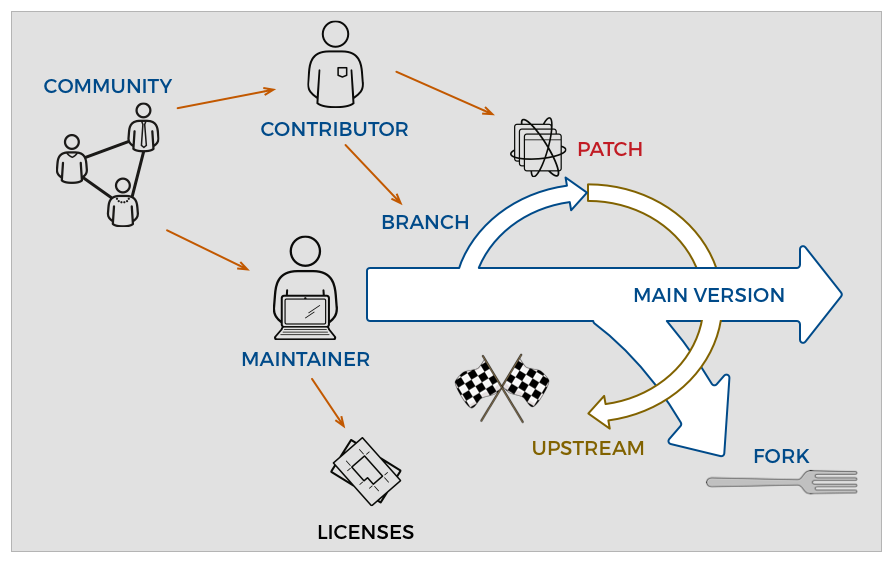Why Open Source Projects Could Be Your Next Big Opportunity
 MAHESH KUMAR
MAHESH KUMARTable of contents
- 1. Introduction
- 2. Benefits of Open Source Projects
- 3. Real World Examples of Successful Open Source Projects
- 4. How to Get Started with Open Source Projects
- 5. What Resources Are Available to Help?
- 6. What Skills are Necessary for a Successful Open Source Project?
- 7. How to Measure the Success of an Open Source Project?
- 8. Conclusion: Why Open Source Projects Could Be Your Next Big Opportunity

Open-source projects offer a wealth of opportunities for motivated individuals looking to make an impact. By contributing to an open-source project, you can gain valuable experience, learn new skills, and build relationships with a diverse community of passionate peers. It is a great way to expand your knowledge, build your portfolio, and reach new heights in your career!
1. Introduction
Open-source projects have become an increasingly popular way for people to collaborate and create something amazing together. And the best part? You don't need to be an expert programmer or have years of experience to get involved. Whether you're a student looking to gain hands-on experience, a developer looking to expand your skills, or just someone who's passionate about a particular project, there's no shortage of opportunities out there. Open-source projects can be a fantastic way to learn new skills, build your portfolio, and make a real impact in the world. Not only that, but they can also be a great way to connect with like-minded individuals and build a community around a shared goal. So if you're looking for your next big opportunity, don't overlook the power of open source. With a little bit of time and effort, you could be part of something truly extraordinary.
2. Benefits of Open Source Projects
Open-source projects are a game-changer in the world of technology. The benefits of open-source projects are numerous and should not be overlooked. Firstly, they offer a collaborative environment where developers from different backgrounds can work together to create software that is innovative, efficient, and secure. This collaborative environment also allows for faster development, as developers can share code, ideas, and knowledge. Additionally, open-source projects are often more affordable than proprietary software, making them accessible to a wider audience. Another benefit is that open-source projects are often more customizable, allowing users to modify the software to meet their specific needs. This level of customization can lead to increased productivity and efficiency. Open-source projects also tend to have a strong community of users and contributors, which can lead to a sense of belonging and a shared passion for the project. Overall, open-source projects offer a unique opportunity for developers to work together to create innovative and accessible software that can benefit everyone.
3. Real World Examples of Successful Open Source Projects
Open source projects have been gaining momentum in recent years and for good reason. Many successful companies and organizations have already embraced open source, and the results speak for themselves. Take, for example, the Apache web server, which powers over 50% of all websites on the internet. Or consider the Linux operating system, which dominates the server market and is used by major corporations such as Google and Amazon. These projects have not only been successful in terms of adoption, but they have also enabled communities of developers to collaborate and innovate in ways that were previously impossible. Open-source projects provide endless opportunities for developers to learn new skills, contribute to meaningful projects, and build a reputation within the community. With so many success stories out there, it's clear that open source is not only a viable option but also a potentially lucrative opportunity for those willing to put in the time and effort. So why not take the leap and explore the world of open source? The possibilities are endless.
4. How to Get Started with Open Source Projects
Open source projects are an incredible opportunity for anyone looking to expand their skills, meet new people, and contribute to a larger cause. But getting started can be daunting. First, you'll need to choose a project that interests you and aligns with your skills. Then, you'll need to familiarize yourself with the project's codebase and documentation. One way to do this is to start with small, bite-sized tasks like fixing a typo or adding a missing feature. As you become more comfortable with the project, you can tackle bigger challenges and contribute more significantly. Don't be afraid to ask for help or guidance from other contributors – the open-source community is known for its supportive and collaborative nature. And remember, contributing to open-source projects is not only a great way to give back to the community, but it's also an excellent way to showcase your skills and make a name for yourself in the industry. So, what are you waiting for? Dive in and start contributing today!
5. What Resources Are Available to Help?
If you're considering joining an open-source project, it's important to know that there are plenty of resources available to help you get started. One of the most valuable resources is the community surrounding the project itself. These communities are made up of people who are passionate about the project and eager to help newcomers learn the ropes. Whether it's through forums, chat rooms, or mailing lists, you can connect with other developers who can answer your questions and provide guidance as you contribute to the project. Additionally, many open-source projects have documentation available online, including tutorials, guides, and FAQs. These resources can help you understand the project's codebase, development processes, and requirements. Finally, there are many online courses and tutorials that can help you learn the programming languages and tools used by open-source projects. With all of these resources available, there's never been a better time to get involved in open-source development and take advantage of the many opportunities it offers.
6. What Skills are Necessary for a Successful Open Source Project?
Open-source projects are a great way to showcase your skills and contribute to the community. However, to be successful in an open-source project, you need to have a certain set of skills. Firstly, you need to be proficient in programming languages such as Python, Java, or C++. You should also be able to write clean, well-documented code that is easy to understand. Collaboration is key in open-source projects, so you should have good communication skills and be able to work well in a team. As open-source projects are often community-driven, you need to be able to receive feedback and adapt to changes quickly. Additionally, having a good understanding of version control systems like Git is essential. Finally, being able to solve problems and think creatively is a must-have skill for any successful open-source project contributor. By honing these skills, you can not only contribute to the community but also gain valuable experience and potentially open up new career opportunities. So why not consider joining an open-source project and start building your skills today?
7. How to Measure the Success of an Open Source Project?
When it comes to open-source projects, measuring success can be a challenge. However, there are a few key indicators that can help determine whether your project is thriving or not. Firstly, the number of contributors is a good place to start. The more people contribute to your project, the more likely it is to succeed. Additionally, tracking downloads and usage of your project can help determine its popularity and impact. Another important factor is the level of engagement within the community. Are people actively discussing and providing feedback on your project? Are there regular updates and improvements being made? These are all signs of a successful open-source project. Finally, don't forget to consider the impact your project is having on the industry or community it serves. Is it helping to solve a problem or fill a gap in the market? If so, then your project is likely making a positive impact and can be considered a success. Overall, measuring the success of your open-source project requires a combination of quantitative and qualitative data, as well as a keen understanding of your project's purpose and goals.
8. Conclusion: Why Open Source Projects Could Be Your Next Big Opportunity
In conclusion, open-source projects could be the opportunity you've been waiting for. By contributing to these projects, you not only gain valuable experience and skills but also become part of a community that is constantly evolving and pushing boundaries. The potential for collaboration and innovation is endless, and the impact you can have on the world is immeasurable. Whether you're a seasoned developer or just starting out, there is a place for you in the open-source community. The best part? It's free and accessible to anyone with an internet connection. So why not take the leap and explore the world of open source? The possibilities are endless, and the rewards are immense. Who knows, your next big opportunity could be just a pull request away.
Subscribe to my newsletter
Read articles from MAHESH KUMAR directly inside your inbox. Subscribe to the newsletter, and don't miss out.
Written by

MAHESH KUMAR
MAHESH KUMAR
Full Stack Developer | Java Developer | Open Source Contributor